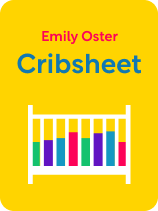

This article is an excerpt from the Shortform book guide to "Cribsheet" by Emily Oster. Shortform has the world's best summaries and analyses of books you should be reading.
Like this article? Sign up for a free trial here.
What parenting research should new parents know about? What challenges do new parents encounter when seeking advice?
Health economist Emily Oster offers parenting advice in Cribsheet—her bestselling book about making data-based parenting decisions. In Cribsheet, she also explains how new parents face three difficult challenges when researching parenting advice for common concerns, like when to start potty training.
Read on to find out the three parenting research challenges Oster identifies in her book.
The Challenges of Parenting Research
Cribsheet author Emily Oster, a mother of two and a professor at Brown University, specializes in health economics. Cribsheet is the second book in her ParentData series, which also includes Expecting Better. Both books focus on ways data can inform your parenting decisions. Oster’s parenting research in Cribsheet is relevant for any parents of young children and soon-to-be parents seeking advice on making research-informed, less stressful parenting decisions.
Oster claims that decisions around parenting are often overwhelming because you must navigate moral judgments, contradictory advice, and confusing data. Parents especially encounter these challenges when seeking advice from people they know (such as doctors, family, and friends) as well as seeking advice from parenting research online or in books.
(Shortform note: The majority of parents turn to the Internet for information to guide their parenting decisions, and research reveals that much of this information is unreliable. For instance, one study that examined online information on caring for preterm infants found that less than half of websites offered trustworthy advice. Health experts who are concerned about the low quality of online parenting advice urge parents to avoid relying on search engine results and instead rely on these two types of online resources: 1) virtual care visits with your child’s doctor; and 2) websites run by physicians.)
The Problem: Parenting Decisions Are Overwhelming
Will breastfeeding your baby raise their IQ? When should you start potty training your toddler? Parents of young children often ask questions like these, as they’re eager to know the right way to parent. However, Emily Oster argues in Cribsheet that there isn’t just one right way to parent a young child. Every family has different goals and situations, so what’s best for one family isn’t always best for another.
In this article, we’ll further explore these three challenges parents encounter when consulting research.
Challenge 1: Moral Judgments
According to Oster, people tend to have strong opinions about which parenting choices make you a good parent, and they harshly judge those who decide differently. Oster surmises that many people attach moral judgments to their opinions to convince themselves that the parenting decisions they made in the past were correct.
(Shortform note: People’s moral judgments about others’ parenting decisions aren’t always based on evidence of those decisions’ actual risks—sometimes, they’re just based on misguided assumptions. For instance, one study found that people harshly judge parents who leave their children unsupervised, even though child abductions are extremely rare. Stories of child abductions receive a disproportionate amount of media coverage, giving people the impression that they’re common. Therefore, people think parents who leave their children unsupervised are neglectful. This judgment can lead to the criminalization of single parents and poor parents, as they’re more likely to leave their children unsupervised out of necessity.)
Challenge 2: Contradictory Advice
People’s opinions on parenting aren’t only judgmental: They’re often contradictory, too. Oster claims that there’s no consensus on the best way to parent because what’s best for one family may not be best for another. Because families have different finances, goals, and needs, they make decisions under different constraints. For example, some parents choose to share a bed with their babies because it improves everyone’s sleep. Other parents find it hard to sleep with their baby in the bed, so they put them in a crib.
(Shortform note: The “ideal” parenting strategy may vary even more than Oster implies here, due to wide-ranging cultural norms. Research shows that different cultures and countries have different norms and practices around parenting. For example, whereas most parents in the US don’t allow their toddlers to walk the streets on their own, many parents in Japan send their toddlers by themselves on errands. Some of these families believe this practice is an important way to develop toddlers’ independence.)
Challenge 3: Data Is Hard to Apply to Your Life
One way parents circumvent conflicting and judgmental advice on parenting is by examining research on parenting decisions. However, research on parenting choices is often hard to interpret and challenging to apply to your own life. Let’s explore two reasons why.
Reason 1: It’s Challenging to Assess Risks for High-Stakes Decisions
First, Oster claims that it’s hard to weigh the benefits and risks of high-stakes decisions: ones that include a risk of death or major injury. When data on a certain parenting decision reveal that an option poses a risk of death or serious injury, we tend to disregard the option’s potential benefits—even if those benefits are significant.
For example, imagine a child is severely allergic to peanuts, and their parent is considering whether to allow the child to share a lunch table with classmates whose lunches may include peanuts. Peanut allergies are potentially fatal: One in every 200 episodes of severe allergic reactions to peanuts results in death. Because peanut exposure has a risk of death, it’s unlikely the parent will spend much time considering the potential benefits of allowing their child to eat with classmates (such as increased social connection).
(Shortform note: In Freakonomics, Steven Levitt and Stephen Dubner explain that this irrationality is rooted in fear: It’s human nature to want to prevent horrifying events, even if those events are extremely unlikely. For this reason, parents also sometimes focus their efforts on the wrong high-stakes decisions. They take extreme measures to protect their children from horrifying yet rare risks instead of protecting them from more common risks. For instance, parents are reluctant to send their children to have a playdate at a house where the parents keep a gun, yet they don’t think twice about sending their children to have a playdate at a house with a pool—even though the latter is statistically more likely to endanger your child.)
Reason 2: It’s Rare for Research to Be Actionable
Second, Oster argues that research on parenting decisions often fails to show causality: evidence that a certain choice causes a certain outcome. Research that demonstrates causality is helpful because it’s actionable: It provides clear evidence that if you engage in a certain action, it’s likely to have a certain outcome. Unfortunately, research projects that demonstrate causality are rare because they’re harder to design and costly to run.
(Shortform note: Recent technological advances are providing researchers with new ways to produce reliable, actionable scientific evidence when it’s too costly to design research projects that show causality. Innovations in electronic health records systems have allowed researchers to study the results of extremely large data sets. These data sets compile information from myriad sources, compensating for a lack of causality with an abundance of evidence. For instance, research using a large data set about diabetes provided ample evidence about the effectiveness of diabetes drugs—evidence that’s just as reliable, if not more so, than previous, smaller-scale studies that showed causality.)

———End of Preview———
Like what you just read? Read the rest of the world's best book summary and analysis of Emily Oster's "Cribsheet" at Shortform.
Here's what you'll find in our full Cribsheet summary:
- Why there isn't one right way to parent a young child
- How to make research-based parenting decisions
- When you should start potty training your toddler






